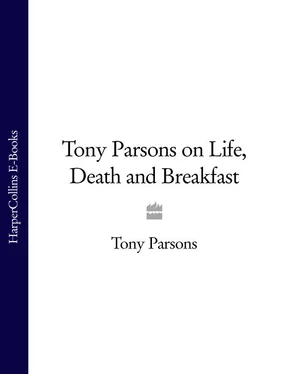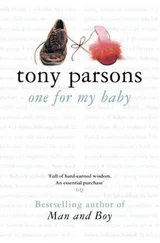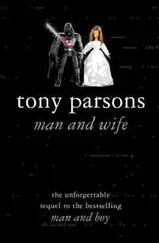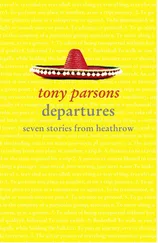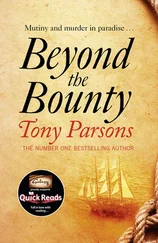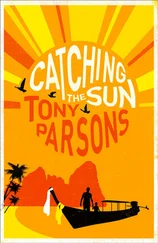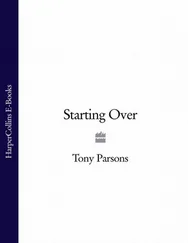Yet I have other friends well into middle age who still have both their parents living. And I have noted that the longer your parents live, the tougher it becomes to let go of them. You would think it would be the other way round – that spending almost half a century with your parents would make you more prepared to let go. But it doesn’t work that way.
And whenever they die – if your father goes when you are still in your mother’s womb, or if your mother goes when you see a middle-aged man you don’t recognise staring back at you from the shaving mirror – the world changes. There is nothing like the death of a parent to help you see the big picture, to truly get it, for the very first time. How could you have missed something so obvious?
Golden lads and girls all must. As chimney sweepers, come to dust.
When you bury your parents, you pull down the barrier between yourself and mortality.
When the first parent goes, the Earth shifts. When the second one goes, the Earth falls apart. When my father died in 1987, my mother left his suits untouched. She slept on her side of the bed. She stayed in the same house – for twelve years and one day – until her own death.
But when the surviving parent goes, the last link to your youth goes with her. Those strange hours spent wandering an empty house, opening drawers, peering into a vanished life, working out what to keep – what is priceless – and what to leave out for the bin men. It is the photo albums that do you in. Not because of all those familiar faces but because of all the faces that you do not know, as the memories of a lifetime dissolve like teardrops in the rain.
You don’t really know your parents until you watch them die. My father was the toughest man I ever knew, and then I saw him in that cancer ward, shot full of morphine, and he was afraid. I was shocked. I had never seen him afraid before, that scarred old soldier. I didn’t think he was capable of fear. That’s how little I knew him.
And my mum was a typical post-war housewife, as placidly faithful as a woman in a Tammy Wynette song.
Everyone thought she would just wither away with her husband gone, this man she had been with since she was sixteen and he was seventeen. And she didn’t.
She discovered some inner steel. She realised she had an army of friends. She even learned that loneliness had its compensations. She could play her country and western records very loudly, without my dad shaking his Daily Express with irritation.
When your parents are around – giving or denying approval to boy and man, diminishing you with just one look or a few sharp words when you break a window, or drop out of school, or get divorced – there are powerful forces preventing you from reaching true maturity. You are still some kind of child until both of your parents are dead. You don’t know them until they are dying and you don’t know yourself.
For most of us, losing a parent is our first real contact with death. Until then, death is an impossibly distant prospect, and we kid ourselves that it can be kept at bay forever if we eat up our greens.
We live in a death-free culture. If you make it out of the womb you are likely to survive childhood. There are no world wars. Your fussy modern car scolds you if you fail to wear your seat belt.
You think you have time to burn until your parents are dying. Then for the first time in your life, your own death is undeniable.
When your parents are alive, you believe you will live forever. From the moment they die, you start counting the years that you have left.
The classic text on bereavement, On Death and Dying , by Elisabeth Kübler-Ross, cites the five stages all men must stop at on their path to death.
First stage – denial and isolation.
Second stage – anger.
Third stage – bargaining.
Fourth stage – depression.
Fifth stage – acceptance.
What is true of the dying is true of the ones left behind. You get over it. You do. With time, scar tissue covers the deepest wounds. You become grateful that this man was your father, that this woman was your mother. You learn to feel blessed for what you had, rather than rail at what has been lost.
Yet you never really get used to it. In an unguarded moment – always some happy moment, when I have some small good news to relate – I am capable of reaching for the phone to call a woman who died in the last century.
Maybe she is watching down. Or maybe not. When I kissed the cheek of my dead mother – already cold, already departed, already truly not her – I did not know if she had gone to heaven, or simply gone. There were no clues.
Only when your parents die do you realise that the clock is running like the meter of a bent mini-cab driver – and it’s running for you. And whatever comes after this short sweet life, be it heavenly hosts or a dreamless void or some great eternal kip, it will not be long until you find out for yourself.
You never argue at airport security. And then one day you do.
You never argue at airport security because those lethargic, blank-eyed men and women are the front line in the war on terror. You never argue at airport security because it is pointless, and they are just doing a job, and the stupid questions-Is this your toothpaste, sir? – and the dumb rituals – they find one shoe bomber and so all of mankind has to take off its footwear until the end of days – are the price we pay for pretending we are safe.
And then one day you snap.
For me it was Frankfurt, when they confiscated the entire contents of my toilet bag – yes, I bet that had old Osama trembling in his cave – and then gave me some insolent lip when I mildly commented that I had lugged all that stuff through Heathrow without anyone raising an eyebrow.
‘Ja,’ said the sausage-munching jobsworth. ‘But here ve haf rules.’
I gawped. I laughed. And then I pointed out that back in the sleepy little place that I come from – London town, Fritz, perhaps you’ve heard of it – ve also haf rules.
‘And the reason we have rules,’ I continued, ‘is because for about seventy years we have had somebody trying to blow us to pieces. Right now it is Islamic nutjobs, but before that we had thirty years of the IRA and before that – I hate to bring it up – it was the Luftwaffe.’ I cackled with derisive laughter. ‘But if confiscating my Gillette Sensitive Skin Shaving Foam makes the fatherland a safer place, then bitte schoen , be my guest.’
Oh, it was an ugly scene. I was too loud. I was too mouthy. But all the pointless bossiness that I have experienced at airports all over the world finally reached critical mass. And I blew. And as I walked away with what remained of my personal belongings – dirty socks and a pair of rusty tweezers – I realised that I had become something I never thought I would be.
I had turned into an angry old man.
We think of rage as being the province of the young. We think of youth as being the age of righteous, red-blooded protest. But the young are not angry any more. The young of the twenty-first century are a placid, bovine, docile bunch, sucking up the Arctic Monkeys on their iPods, dreaming of catching Simon Cowell’s eye.
They might fret about the environment, but they are not angry about it – not really. They might be a bit miffed about what we get up to in our distant wars, but I don’t see them marching to Downing Street or rioting in Grosvenor Square. They might get a bit trembly-chinned over Third World poverty, but they think that watching Coldplay in Hyde Park and flashing their student union Visa card will wipe away Africa’s tears.
The young are no longer capable of anger. If you want to see genuine fury at the way of the world, then look at a man on the far side of thirty. And as he gets older – thirty-one, thirty-two, forty, fifty – the anger builds. By the time I am sixty I confidently expect to be on the roof of a public building somewhere with a high-powered rifle while the neighbours reflect, ‘Well, he was always a bit of a loner.’
Читать дальше
